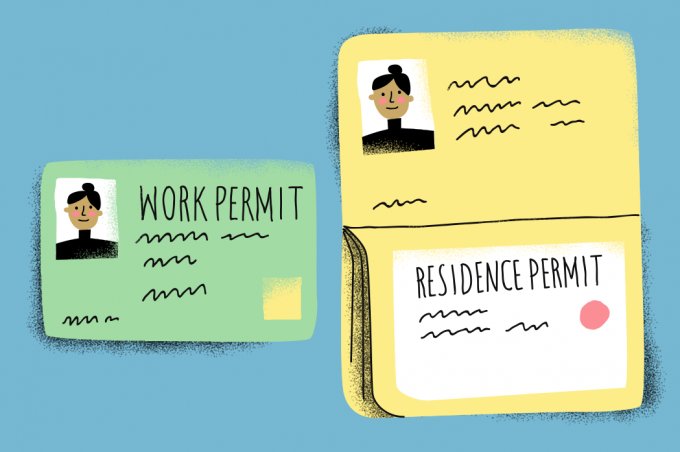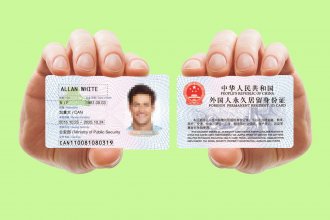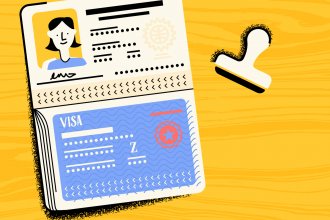If you are working in Shanghai, you may at one point or another consider changing jobs. While it may seem like a daunting task consisting of the transfer of work permits, cancelation of visas and perhaps multiple trips to the Entry-Exit Bureau, we have done our best to outline and simplify the process below.
The 2 Documents You Need to Work in China
From the outset, a distinction needs to be drawn between two main documents, namely the Foreigner’s Work Permit and the Residence Permit.
The Foreigner’s Work Permit (外国人工作许可证) is a document from the Chinese authorities which permits a foreigner to be employed in Shanghai. There are 3 classes of Work Permits: class A for highly skilled workers, B for professionals and class C for low skilled workers.
The Residence Permit (居留许可证) draws reference to a person’s visa status and determines how long they are able to stay in China, as well as the type of entry they are permitted (single or multiple entry). The most common type is a Temporary Residence Permit, however a Permanent Residence Permit (also called a Green Card) is also available.

The 6 Step Guide to Switching Jobs
The following six steps are the main points to note when changing jobs in Shanghai:
1) Finding a New Employer
Prior to submitting your resignation letter, you must first find another company that is able to provide you with a valid job offer. A valid job offer must be in writing (Email is ok), and should set out the details of what the company is offering as well as the conditions of the employment (this can be in English or Chinese). The job offer should clearly state that the company will provide a work visa for you. Every legally registered company in China is able to hire foreigners, but if you aren't sure if the company that gave you an offer is legally registered, ask for their Chinese company name and search for them on this Shanghai government website.
2) Resignation
Once an offer has been received by another company, you must then submit a letter of resignation (离职信) to your current employer. Generally, your letter of resignation should include a statement that clearly states your intent to resign and your expected last day of work (based on the notice period in your employment contract).
Review your current employment contract to find out the period of time required for you to submit your notice. As an example, you may have agreed to a period of more than 1 month in your employment contract, and if you leave earlier without the company’s approval, then you will be in breach of contract. A resignation letter can be submitted in English, provided your employment contract does not expressly require you to submit it in Chinese. If your current contract expires then you aren't required to hand in your letter of resignation but again, keep in mind that you should try to keep a good relationship with your previous employer so it's always best practice to put all your cards on the table.
3) Cancellation of Work Permit
When you have submitted your letter of resignation, your current employer must then proceed to cancel your work permit. The cancellation process is done on an online platform by your current (former) employer. Thereafter, you will receive a cancellation letter (原单位的外国人就业证注销信)) also known as a leave letter (原单位的外籍员工离职信), which is issued by your former company stating that you are no longer an employee. The cancellation letter is very important and needs to be both signed by you and sealed by the company.
You will be required to sign two documents, namely: i) The application form for cancellation of a foreigner’s work permit (注销申请表); and ii) The cancellation letter in Chinese, which states that you have ceased to work for your current employer (离职证明).
4) Application for Temporary Residence Visa
When the Work Permit has been canceled, then the Residence Permit would also be canceled (which is normally done by your previous employer). However, your new employer can also assist you to cancel your Residence Permit. Once your Residence Permit has been canceled, you will immediately be required to apply for a temporary residence visa (humanitarian visa), which is valid for one month.
So, just to clarify, there's no actual way of moving a resident permit over to a new employer, it will always get cancelled and you'll have to apply for a new one. However, all the difficulties you have to go through on the initial setup (e.g. the hospital check, the trip to Hong Kong) are no longer required.

5) Application for New Work Permit
Once the Work Permit has been canceled, a cancellation certificate (外国人来华工作许可注销证明) will be issued. This letter must then be given to your new employer in order to apply for the new Work Permit. The new Work Permit application is usually handled by the new employer and is completed on an online platform. If all documents have been accepted online, you will then be required to submit them in person at the relevant Foreign Experts Bureau (外国人来华工作许可), which differs according to the district your company is registered at.
**Note: If for some reason your application exceeds the normal time limit (usually around one month), you may need to provide the documents that were submitted in your initial application. This could include your relevant university degree (legalized and notarized), a health report and a clear criminal record certificate.
6) Application for New Residence Permit
Once your Work Permit has been processed, you must then apply for a new Residence Permit (this is attached to your Work Permit). This process usually takes around seven working days. However, if you have canceled your previous Residence Permit and a period of three months has passed, you will be required to undergo a new medical check.
Good to know...
Overstaying Your Visa
During the transfer period, you will switch to a humanitarian visa with a validity period of one month. If you are unable to complete the transfer of your Work Permit and Residence Permit during this period, you may apply for another humanitarian visa. However, you will be required to provide a valid reason for it to be approved.
How Long Does the Process Take?
The length of time is usually dependent on how quickly your current/former employer takes to start the process, as well as if you have all the correct documents and information. Usually, the process should take around one month. If you are changing professions, or your application has taken too long during the transfer, more time may be required.

Ensure Good Relations with your Outgoing Employer
It is important to try and ensure that you have good relations with your previous employer, as their co-operation is necessary for the prompt transfer of the Work Permit. They are also able to provide comments and reasons for your transfer, which will be seen by your future employers.
If you do have an issue with an employer, where they do not want to release you from your contract and you have given them adequate notice, then they will be in breach of contract. You will be able to enforce the contractual remedies available to you. Disputes with an employer can generally be dealt with at the Shanghai Labor Arbitration Commission (上海市劳动仲裁委员会). Additionally, it is important for you to ensure you do not act in breach of your contract or break it illegally, as this may cause complications during your work permit application.
Although the details of each case may vary, this outline gives you an idea of the process that needs to be followed. There may be a number of other factors that can affect your application and the time frame, so be prepared for any additional requests or delays. If you are considering changing jobs, check out our jobs page for more opportunities across a range of different industries.
I want to Quit My Job But Don’t Have a New Job Yet?
Sometimes it may happen that you want to quit your job, or you suddenly find yourself unemployed. In such cases, you may be lucky, and your company may not cancel your residence permit, affording you some time to look for another job. If you find yourself in the unlucky position of your work permit and visa being canceled, you may have to go on an aggressive job search, consider studying at a Chinese university or start looking for opportunities elsewhere.
*
This article was a written collaboration between the SmartShanghai editorial team and freelancer writer Lloyd Attwell. Clarification about the legality of work permits within this article were reviewed by SmartShanghai's lawyer Art Dicker. Need help in navigating through the process? SmartShanghai also has a database for Visa Agencies in Shanghai. Or browse our full list of visa agencies here.
































